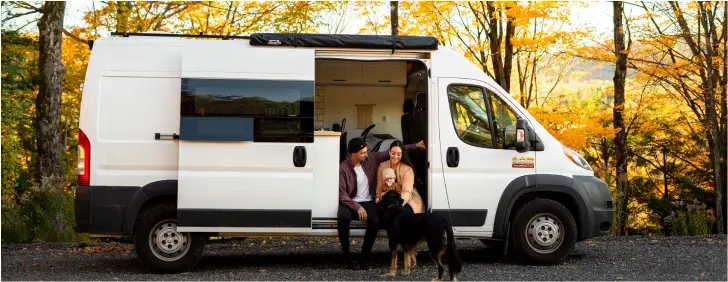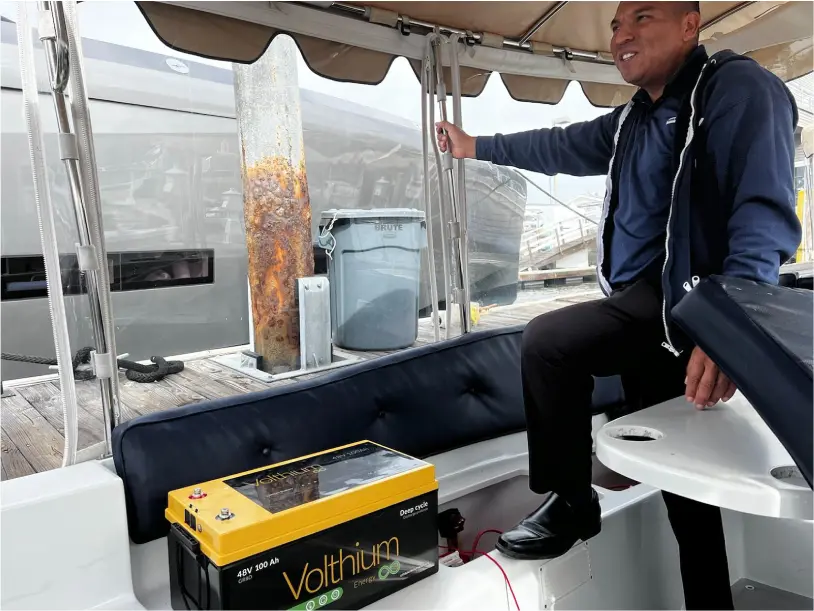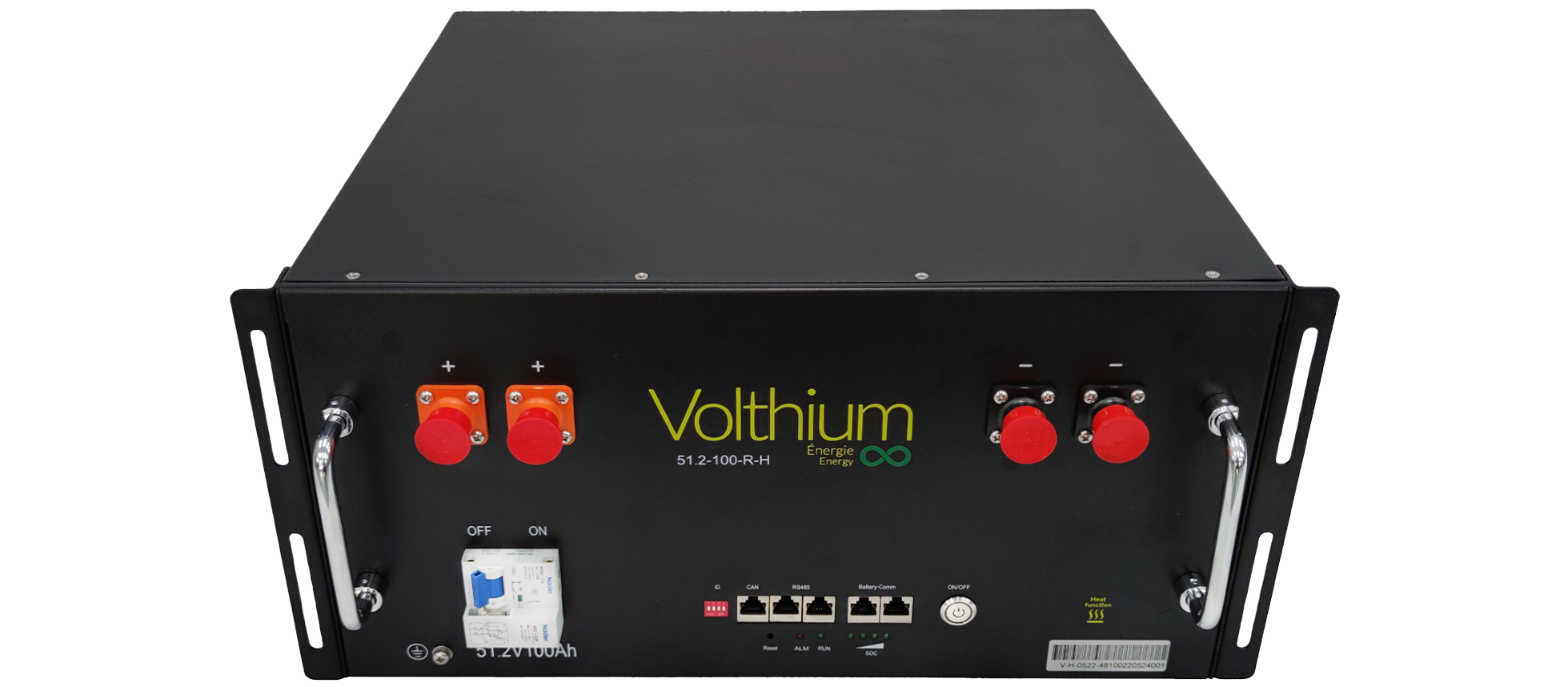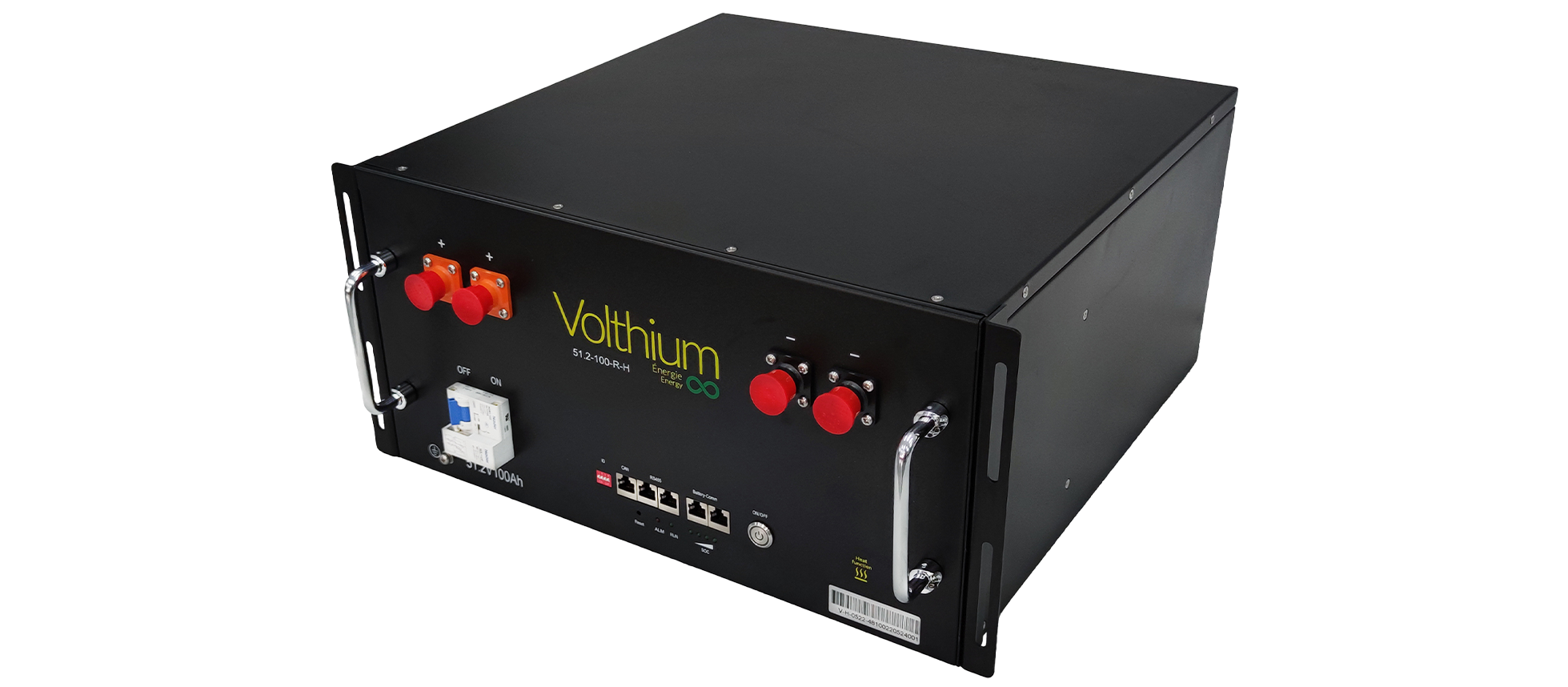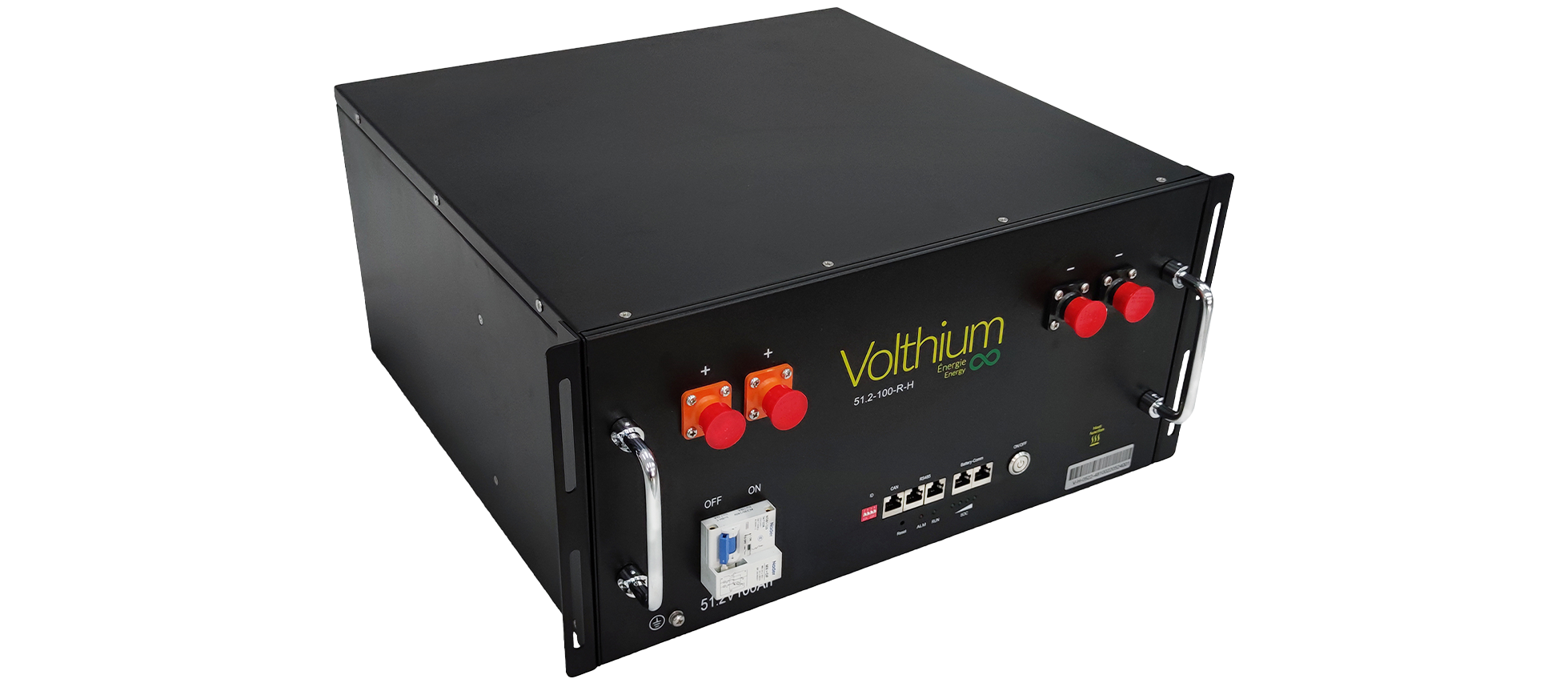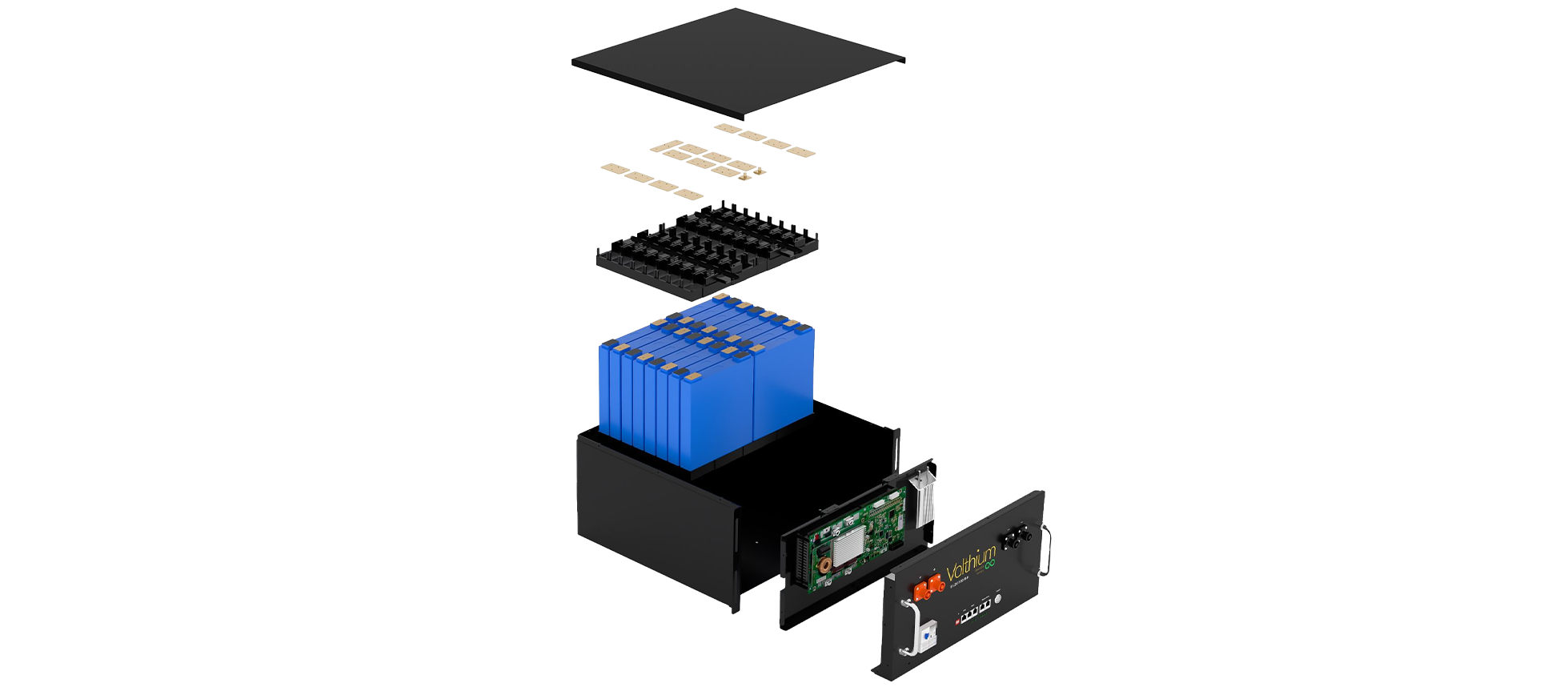DESIGNED TO BE EASILY RACK-MOUNTED!
Our 5.12 kWh 5U rackmouts batteries cannot be purchased online.
Contact us to learn more about our different models and to find the distributor closest to you!
NEED HELP CHOOSING A MODEL?
Contact us! We will identify your need.
DENSITY
Replaces 4 batteries
6 V L 16 Lead Acid
Weighs only 104 lbs
CONCEPTION
100%
Canadian
PROFITABILITY
2.6X more economical (15-year actual cost of ownership)
KEY FEATURES
5 COMMUNICATION PORTS
2X RJ45 (ES485)
2X RJ45 (battery-comm)
1X RJ45 (CAN)
DISCHARGE CURRENT
150 A continuous
ON/OFF SWITCH
Protects against unwanted discharges
CIRCUIT BREAKER
Protects the electrical system from damage caused by excessive current
COMPATIBILITY
100% compatible with inverters available on the market!
SIZE
5U form factor
465 X 435 X 222 mm
18.3 X 17.13 X 8.74 in
FIXATION
Mounts for easy rack installation
10 YEARS
WARRANTY
COLD CHARGING PROTECTION
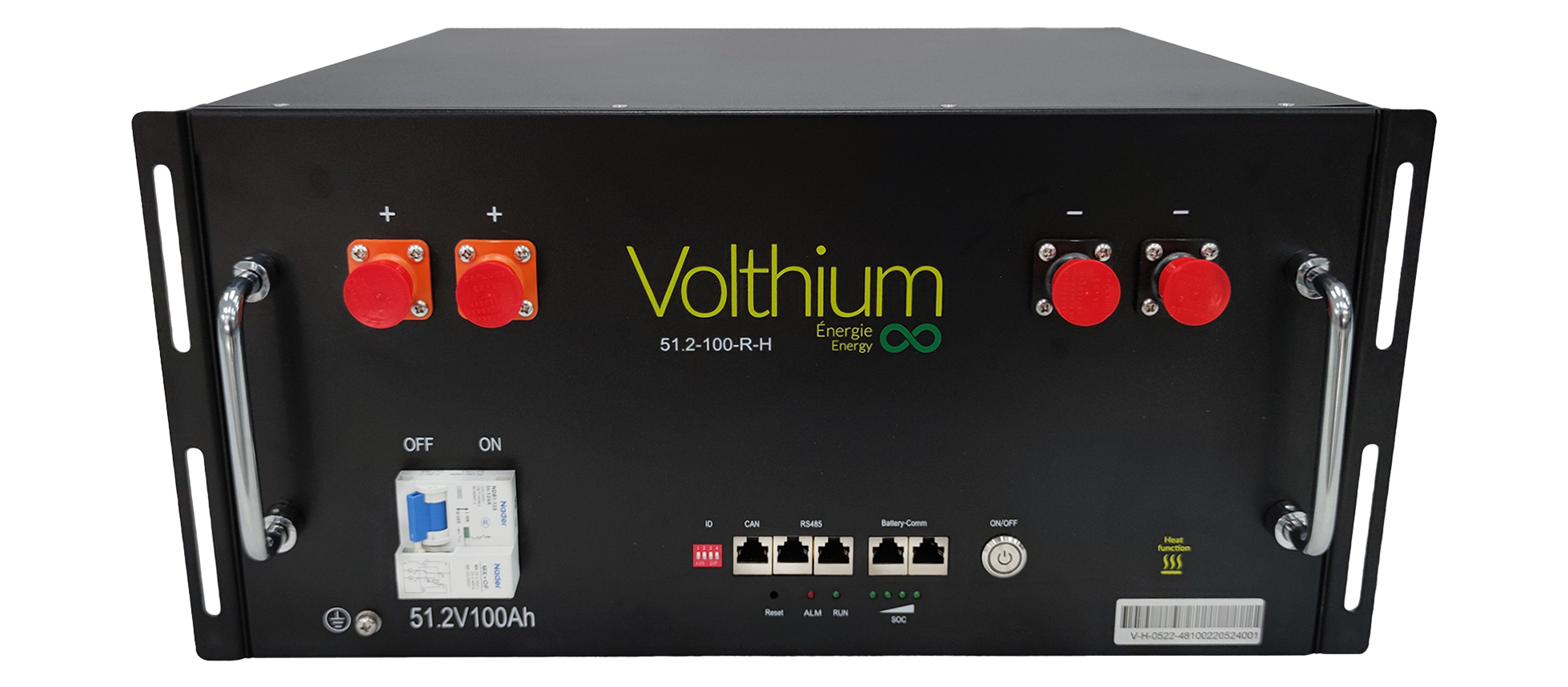
DESCRIPTION
The LFP 51.2V 100Ah Rackmount Solar Storage Battery is a high-end product custom-made for a mainly commercial and industrial clientele.
It is designed to be rack-mounted such as in server rooms, telecommunication towers, micro-power plants or even in residential installations.
The width is standard 19′. It is available in several versions:
- 51.2V 100Ah – 5.12 kWh – Standard – 200lbs – 27′ deep
- 51.2V 100Ah – 5.12 kWh – Self-heating – 200lbs – 27′ deep
The battery is designed for solar storage banks ranging from 5 kWh to 500 kWh. This type of modular battery is mainly used for self-contained homes, server rooms, telecommunication towers, and micro power plants. Our Rackmount batteries are compatible with all inverters on the market. Rackmount batteries incorporate MODBUS communication ports such as CAN and RS485. Volthium is constantly integrating new communication protocols to interconnect with final energy equipment. The equipment currently supported for direct communication (RS485 or CANBUS) are:
- Victron Energy
- Solark
- SUN-SYNK
- Growatt
- Windows 7/10 and Windows Server
- Schneider
Please note that Volthium develops the custom programming of protocols requested by customers or for the integration of new brands of equipment.
10-year warranty
Lifespan 15+ years
Operation average over 6000 cycles
Certifications: Breaker : UL1077 & CSA C22.2 No. 235-04 and UL489 & CSA 22.2 No. 5, UL1977
Terminal UL1973 Cells & UL9540A Intertek Certified Complete Assembly (ETL).
If the application for CSA certification is requested at the time of order ($), the batteries will be delivered with the CSA UL1973 label affixed.
BMS:
The core of the BMS of our Rackmount batteries is produced by the American company Microchip Technology (formerly known as Gi, a branch of Motorola). This manufacturer of BMS microcontrollers is recognized worldwide in the field of electric automobiles, especially for its customers such as Toyota, Lexus, Audi, Mercedes, Volvo, and many others. The programming and communication protocols are entirely developed by our engineers in Quebec.
Cells:
Rackmount Volthium solar storage batteries are equipped with GRADE A prismatic cells, whose supplier, operating for more than 22 years, is famous worldwide for its contracts with, among others, LG chem, BMW, AUDI, Volkswagen and Tesla. The quality of the LFP cells is paramount. Indeed, it is what ensures that you have a durable product whose long-term performance will be faithful.
Engineering: A true pillar, bringing together the strength of each of the parts that make up the product. Our engineering is distinguished by the choice of the best components in each industry, with the aim of obtaining the best final product, scalable to future needs and impossible to compete. The continuous integration of new communication protocols, combined with the custom development implemented for customers, in addition to integrating technologies perfectly adapted to our Canadian environment makes Volthium a benchmark in terms of design quality.



INCLUDED

51.2 V 100 Ah battery - 5U rackmount
Lithium batteries are one of the most common energy storage technologies today, widely used in a variety of applications, from electric and recreational cars (RVs), water vehicles, solar storage banks, medical and industrial applications. The basic principle of their operation is the mobility of lithium ions between the two electrodes: the anode (negative electrode) and the cathode (positive electrode), via an electrolyte.
- Composition: Lithium batteries are typically made up of three main components: the anode, cathode, and electrolyte. The anode is usually composed of carbon, most often in the form of graphite. The cathode of LifePO4 batteries such as the ones we manufacture is made of lithium iron phosphate, iron phosphate promotes a strong molecular bond, which withstands extreme load conditions, extends service life, and maintains chemical integrity over many cycles. For other lithium batteries, the cathode is usually composed of a lithium metal compound, such as lithium cobalt, lithiated manganese, lithium nickel, or a mixture of these elements. The electrolyte is a chemical substance that allows lithium ions to pass between the anode and the cathode. At Volthium, we believe that LifePO4 batteries are the best alternative for different reasons.
- During charging: When the battery is charged, i.e. when the current is applied, the lithium ions move from the cathode to the anode via the electrolyte. During this process, lithium ions are “inserted” into the anode structure, a process called intercalation.
- During discharge: When the battery is used to power a device, i.e., when it is discharged, lithium ions move from the anode to the cathode, a process that releases energy. The mobility of lithium ions from the anode to the cathode is what generates the energy needed to power the device.
- Capacity and durability: The capacity of a lithium battery is determined by the amount of lithium it can store, which in turn determines how much energy it can provide. However, it is normal for the capacity of a battery to decrease over time, a phenomenon known as battery degradation. This is due to several factors, including temperature, overcharging and discharging, and general battery usage. However, thanks to the quality of our batteries and in particular our grade A+ cells, our batteries are guaranteed for 10 years and offer a lifespan of about 15 years.
LiFePO4 batteries, known for their lithium iron phosphate composition, are distinguished by their durability and superior energy capacity, especially in demanding applications such as recreational vehicles (RVs), trailers, and cottages. In Canada, where the search for reliable and sustainable energy solutions is constant, lithium LiFePO4 batteries are increasingly preferred over traditional lead-acid batteries, thanks to their long lifespan that can reach up to 3000 cycles at 100% discharge without significantly damaging the remaining capacity of the battery.
Volthium offers a range of 12V and 200Ah LiFePO4 batteries, equipped with grade A cells guaranteeing optimal efficiency. These batteries offer a shorter charging time and greater energy capacity, making the installation of a solar panel for energy storage even more cost-effective. Their high charge rate and stable voltage allow any electrical equipment to be efficiently powered, without the risk of overheating, thanks to the intrinsically safe lithium iron phosphate technology.
There are several types of lithium batteries, which are usually differentiated by the material used for the cathode (the positive electrode). The most common types are lithium cobalt (LiCoO2), lithium manganese (LiMn2O4), lithium nickel manganese cobalt (NMC), lithium nickel cobalt aluminum (NCA), and lithium iron phosphate (LiFePO4 or LFP) batteries. Volthium batteries are Iron Phosphate batteries known as LiFePO4 and LFP which are a kind of lithium-ion battery. They differ from other types of lithium batteries in their use of iron-phosphate for the cathode, rather than cobalt or nickel. They are said to have the following qualities:
- Safety and stability: LFP batteries are known for their safety and superior thermal stability. Compared to other types of lithium batteries, they are less likely to overheat or catch fire if malfunctioned or misused. This increased safety is due to the intrinsic stability of iron phosphate.
- Durability and life cycle: They also have a long service life and can maintain a high load capacity even after many charge and discharge cycles. They have a low self-discharge rate, which means they can hold their charge for long periods of time without use. Our products offer more than 6000 cycles and have a service life of about 15 years.
- Environmental performance: In comparison, LFP batteries have a potentially lower environmental impact. Iron is more abundant and less toxic than cobalt and nickel, and iron mining has a lower environmental impact. In addition, LFP batteries are easier to recycle than other types of lithium batteries.
Reducing our dependence on fossil fuels, improving air quality, managing e-waste more responsibly ; Lithium batteries have had a significant positive impact on the environment, playing a critical role in the transition to a cleaner and more sustainable society. Their increasing adoption in various areas, such as electric vehicles and renewable energy storage, has helped to significantly reduce greenhouse gas emissions from transportation and power generation.
Lithium battery recycling has also become more efficient, allowing valuable materials such as lithium, cobalt, and nickel to be recovered and reused in new batteries or other applications.
DO YOU NEED
HELP IN DECIDING?
The best battery for your unique needs.
